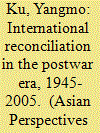| Srl | Item |
| 1 |
ID:
085292


|
|
|
|
|
| Publication |
2008.
|
| Summary/Abstract |
Under what conditions do sets of two former adversary states with deeply rooted historical animosity try to reconcile with each other? When they seek bilateral reconciliation, why are the outcomes significantly different? France and Germany were historic antagonists that fought three catastrophic wars between 1870 and 1945. In the postwar era, however, their antagonism and hostility dramatically evolved into mutual partnership and cooperation. Unlike the Franco-German case, Japan-Republic of Korea relations still remain frigid due to mistrust and enmity, although sixty-three years have passed since Korea's liberation from Japanese colonial rule. This article argues that in both cases, the motives for reconciliation were mainly derived from realpolitik concerns such as security and economy. Structural conditions also affected the initiation of international reconciliation. Nonetheless, it was the dynamics of political leaders and nongovernmental organizations that played central roles in differentiating the reconciliation processes and outcomes in the two dyadic relationships.
|
|
|
|
|
|
|
|
|
|
|
|
|
|
|
|
| 2 |
ID:
169260


|
|
|
|
|
| Summary/Abstract |
The so-called “Comfort Women” Agreement, ratified in December 2015, was intended to bring closure to South Korea's historic grievances against Japan regarding the issue of wartime sexual slavery. However, tensions were reignited when the process and content of the deal were heavily criticized, exacerbating the strained relations between the two countries, as well as divisions within them. Little attention has been given to what happened after the Asian Women's Fund was established in 1995, how bilateral relations shifted, and how the politics changed within South Korea and Japan. This study examines the domestic divisions and conflicts in Japan and South Korea following the introduction of institutions intended to achieve reconciliation. More specifically, it analyzes the factors underlying these divisions and suggests some solutions. In order to do so, this study studies the 1995 Asian Women's Fund and the 2015 “Comfort Women” Agreement, analyzing the implications of these cases in the domestic politics of and bilateral relationship between Japan and South Korea.
|
|
|
|
|
|
|
|
|
|
|
|
|
|
|
|